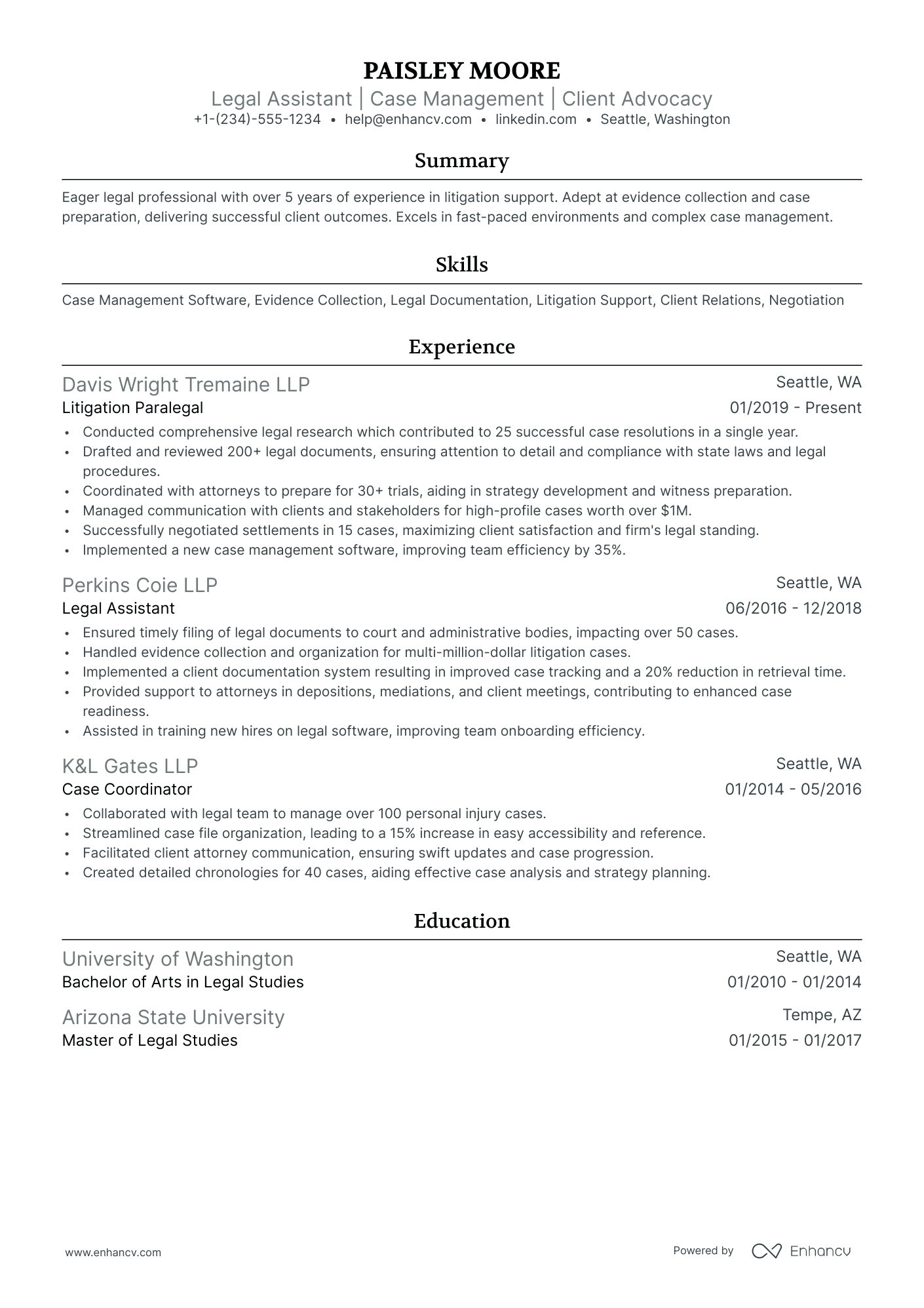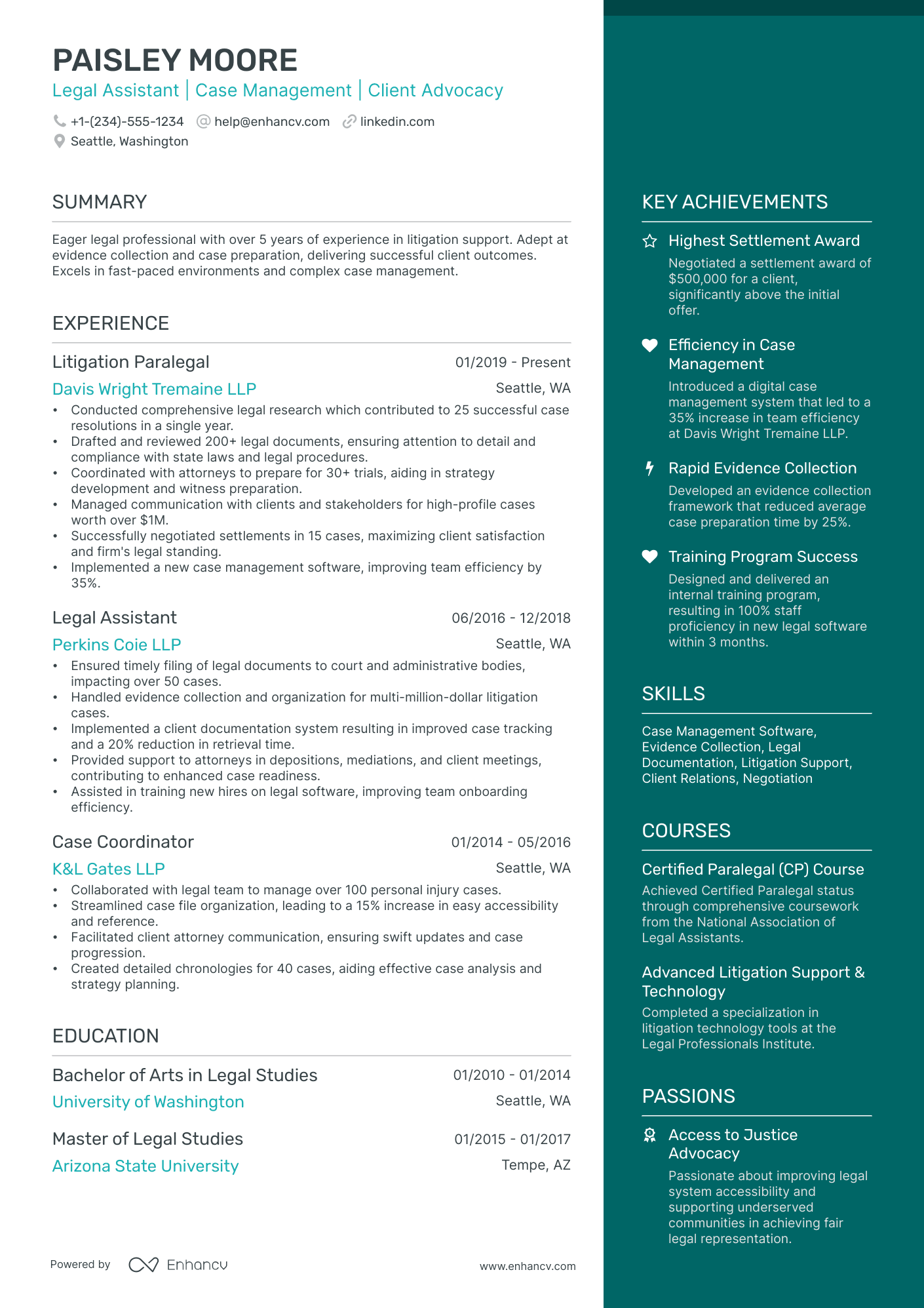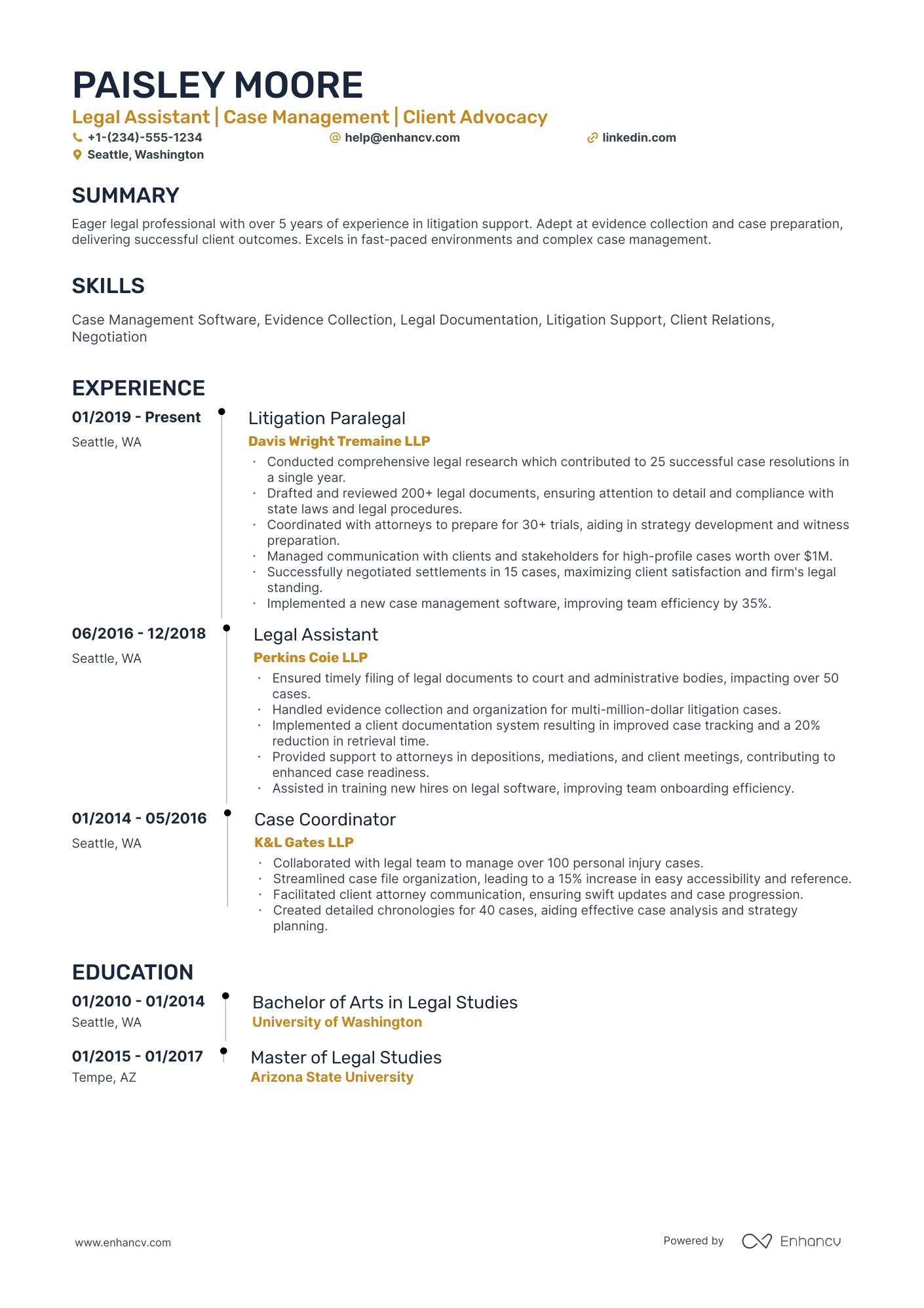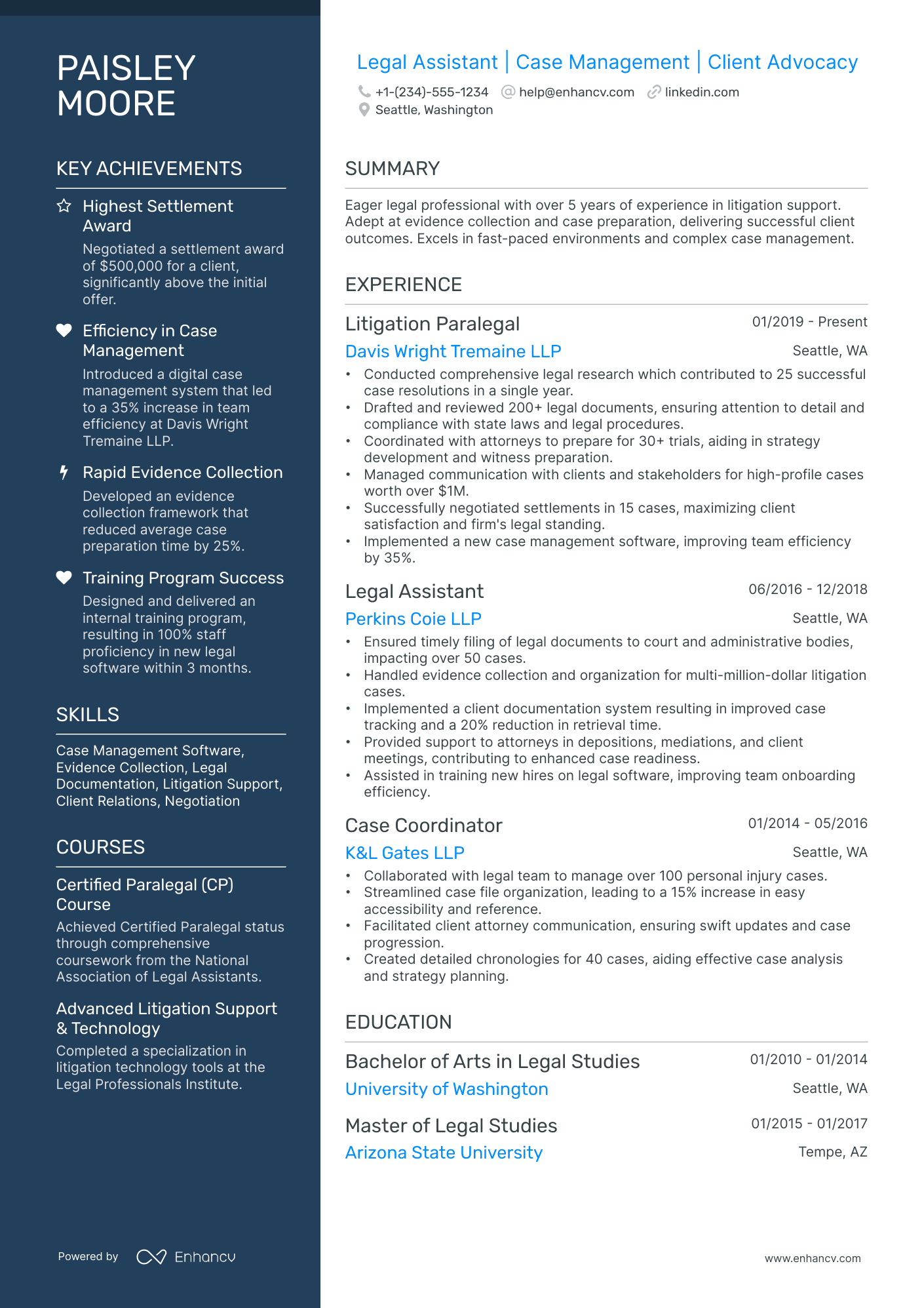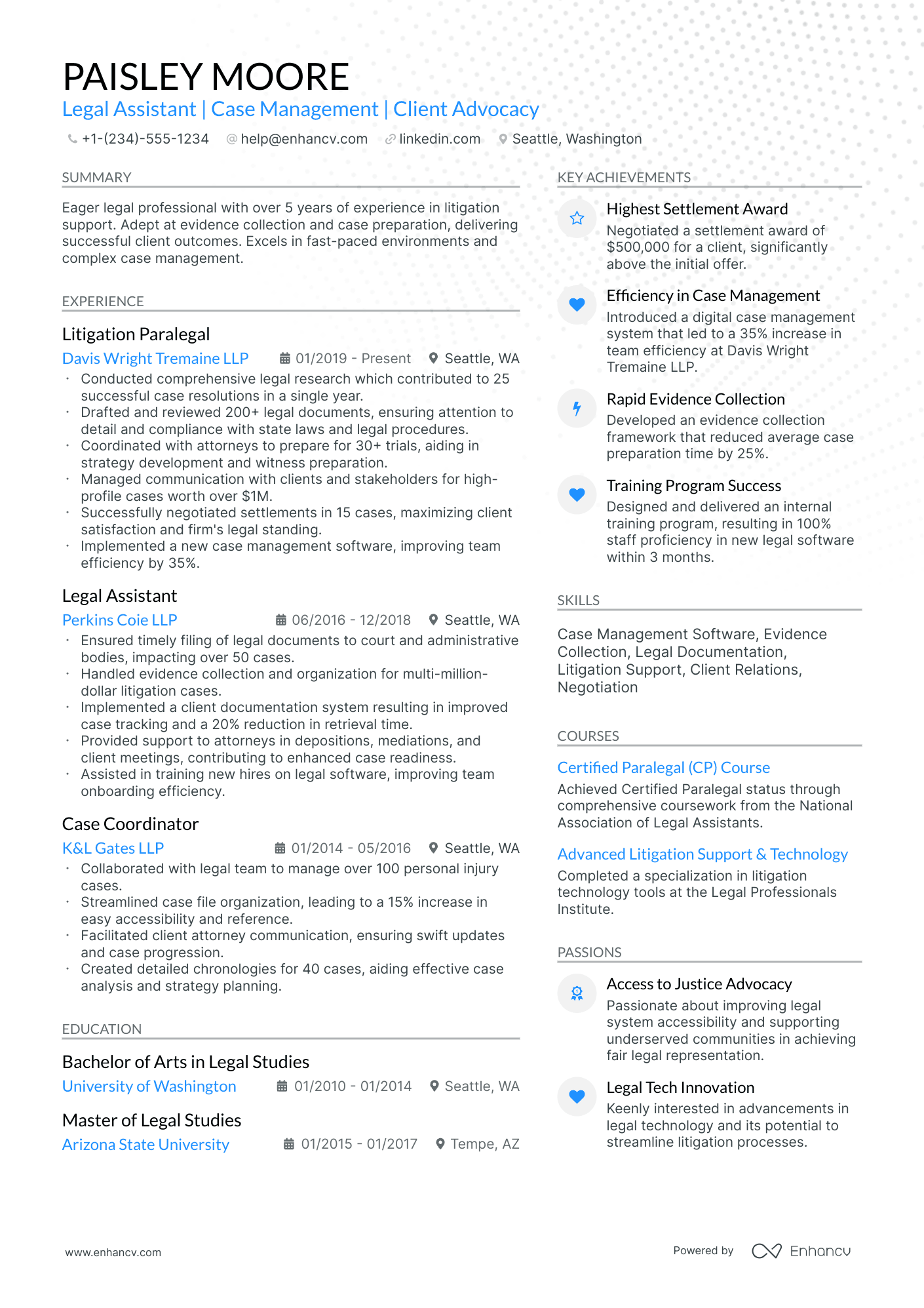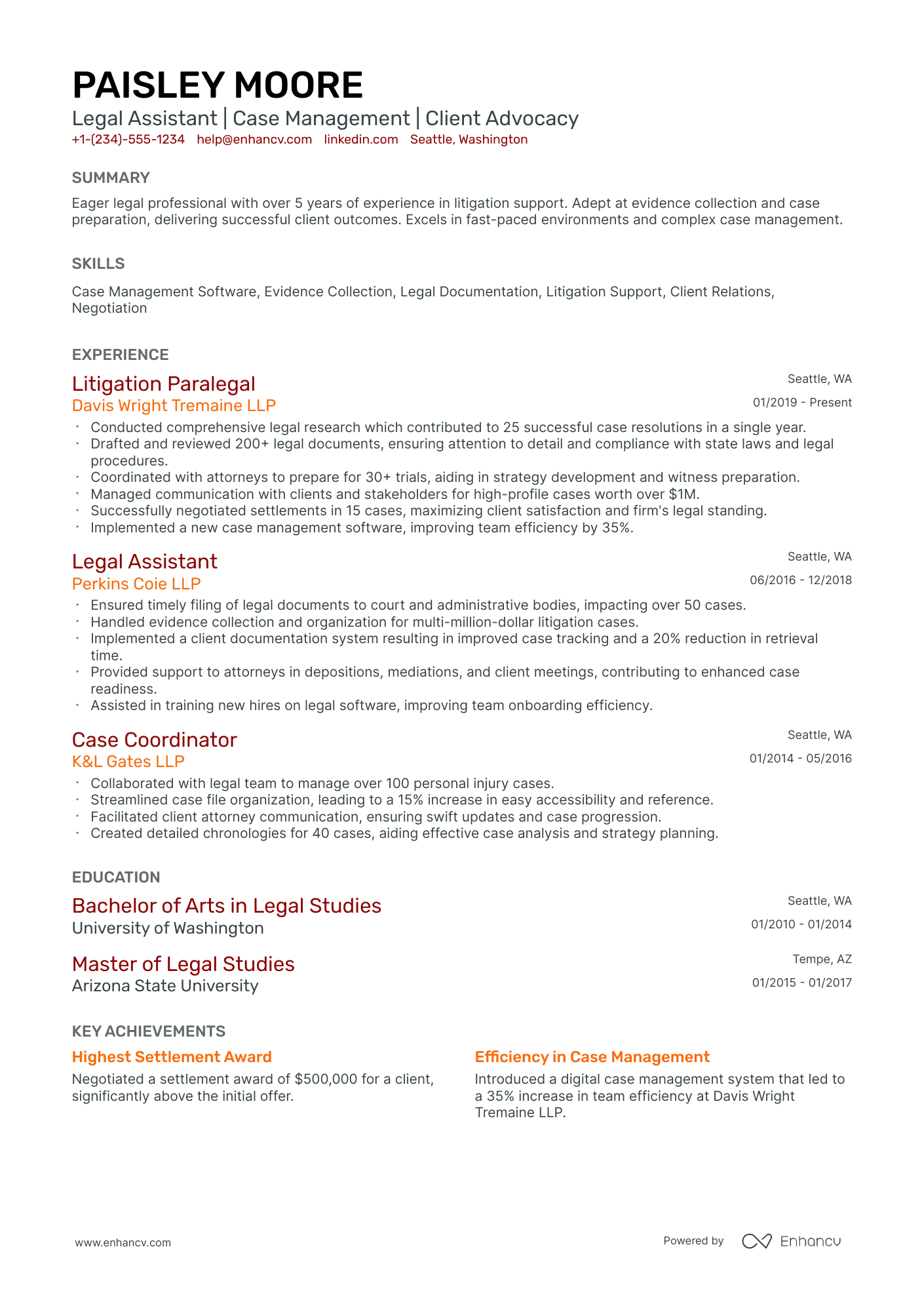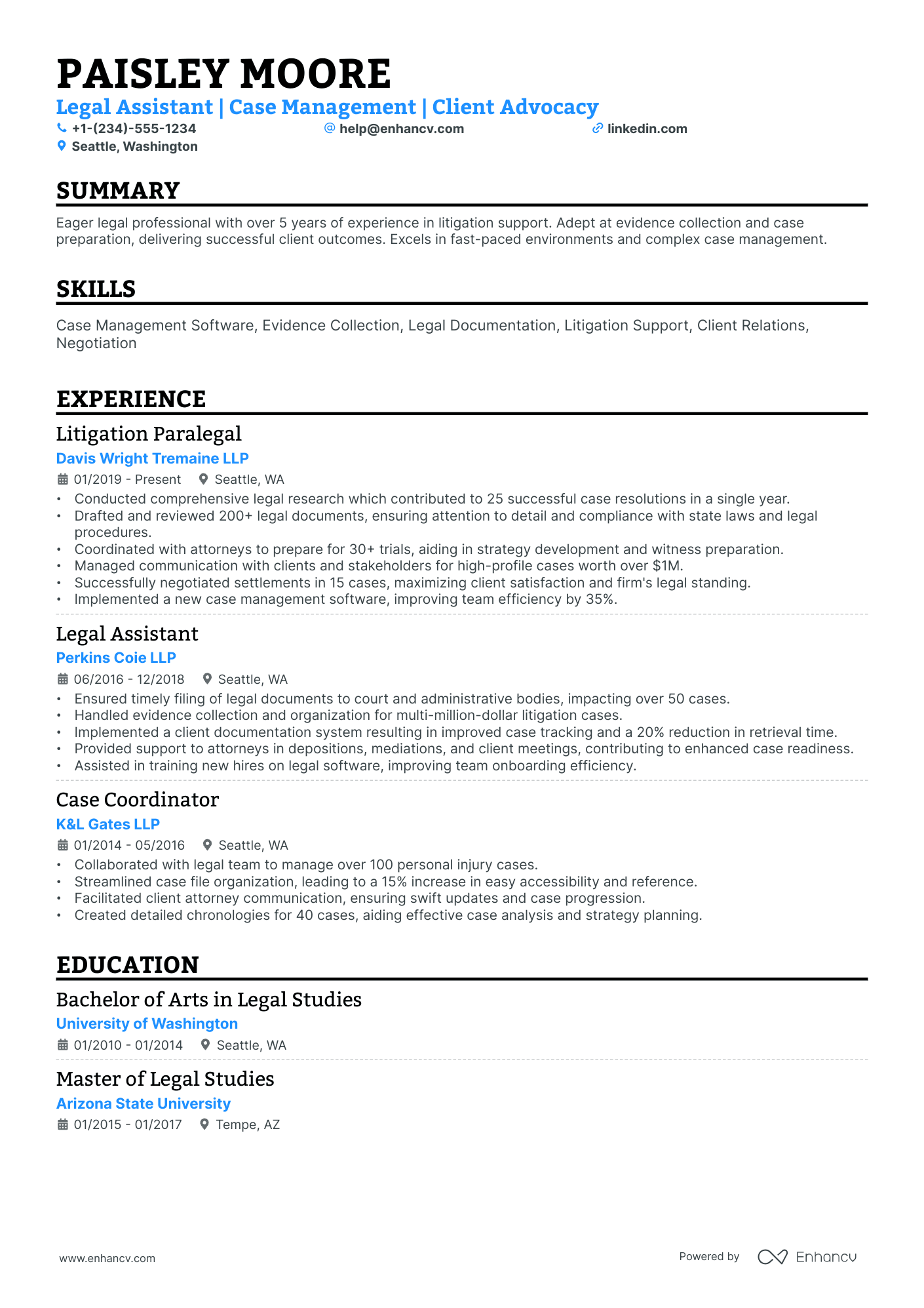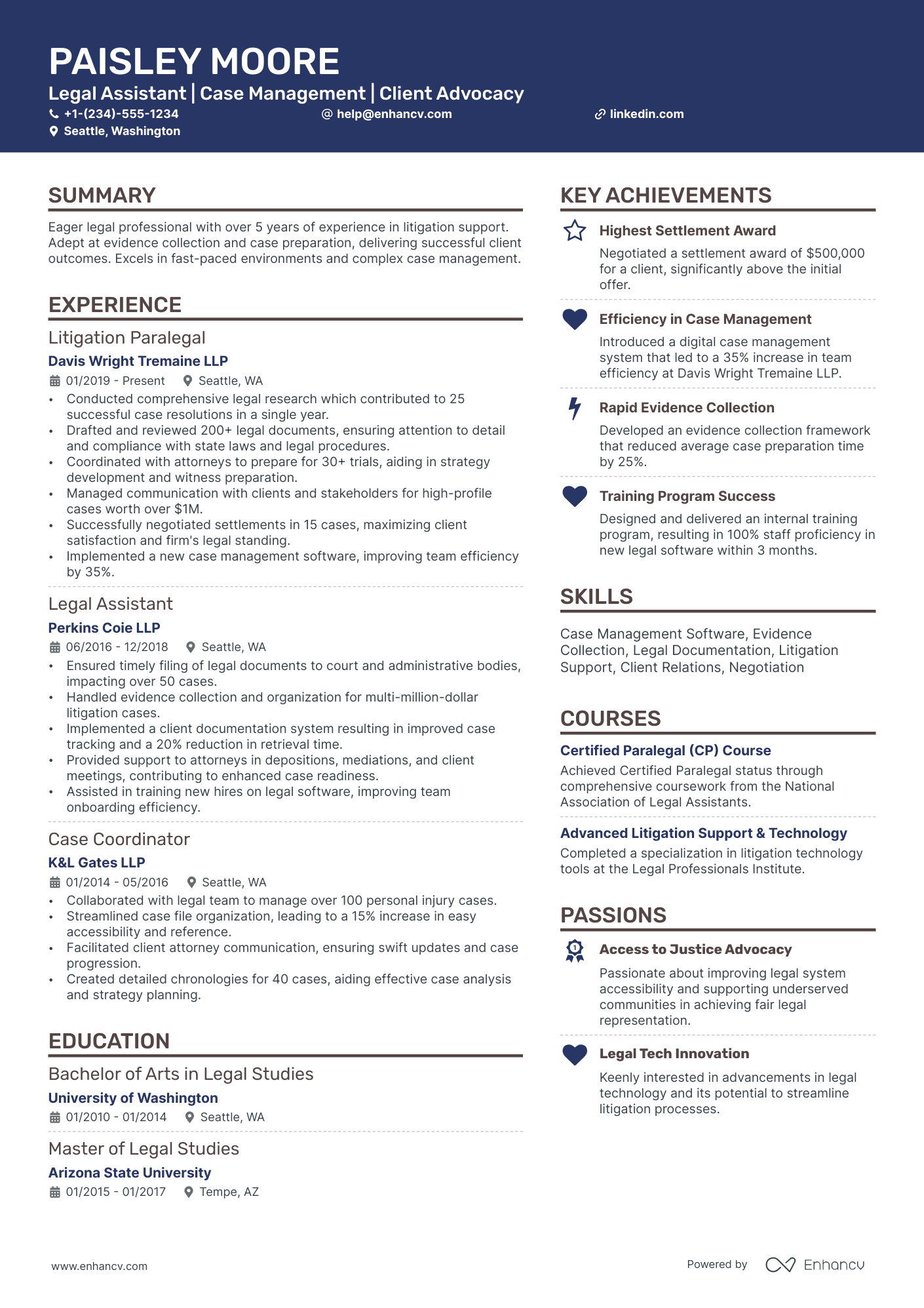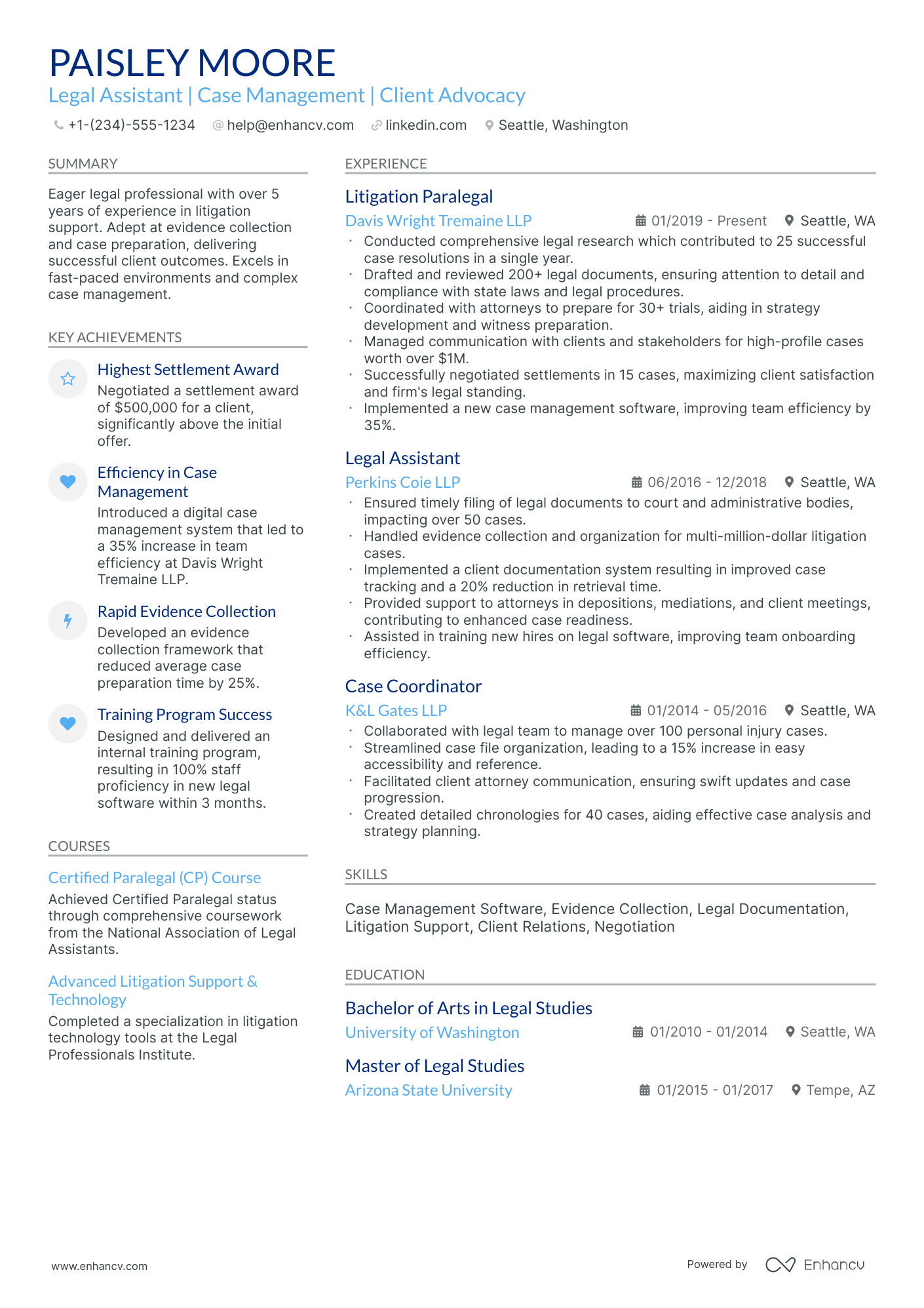Most case manager resume drafts fail because they read like task logs and bury results under dense wording. That hurts when an ATS filters by keywords and recruiters scan fast in a crowded applicant pool.
A strong resume shows what changed because of your work, not just what you did. If you're unsure where to begin, learning how to write a resume from the ground up can help you avoid common mistakes. You should highlight reduced caseload backlogs, improved care plan adherence rates, faster referrals, fewer readmissions, higher client satisfaction, audit-ready documentation, and outcomes across complex, high-risk populations.
Key takeaways
- Quantify caseload size, client outcomes, and cycle times in every experience bullet.
- Use reverse-chronological format if you have direct case management experience.
- Tailor each resume to the job posting's terminology, tools, and compliance standards.
- Place certifications like CCM or ACM near the top when the role requires them.
- Demonstrate skills through measurable results in your summary and experience sections.
- Entry-level candidates should lead with transferable skills, practicum work, and project outcomes.
- Use Enhancv's tools to tighten bullet points and align your resume with specific job descriptions.
Job market snapshot for case managers
We analyzed 5,448 recent case manager job ads across major US job boards. These numbers help you understand industry demand, top companies hiring, employer expectations at a glance.
What level of experience employers are looking for case managers
| Years of Experience | Percentage found in job ads |
|---|---|
| 1–2 years | 14.5% (789) |
| 3–4 years | 7.9% (432) |
| 5–6 years | 2.7% (146) |
| 7–8 years | 0.2% (10) |
| 9–10 years | 0.1% (5) |
| 10+ years | 1.2% (64) |
| Not specified | 73.5% (4004) |
Case manager ads by area of specialization (industry)
| Industry (Area) | Percentage found in job ads |
|---|---|
| Healthcare | 51.5% (2805) |
| Finance & Banking | 30.0% (1636) |
| Government | 14.7% (802) |
| Education | 3.0% (166) |
| Real Estate & Construction | 0.3% (19) |
Top companies hiring case managers
| Company | Percentage found in job ads |
|---|---|
| CVS Health | 8.7% (472) |
| State of Tennessee | 6.5% (355) |
| Elevance Health | 3.4% (183) |
| Fusion Medical Staffing | 2.3% (123) |
| State of Arizona | 2.1% (115) |
| Compassus | 1.8% (99) |
| Res-Care, Inc. | 1.8% (99) |
| Encompass Health Corp. | 1.8% (98) |
| UnitedHealth Group Inc. | 1.7% (95) |
| Amedisys Inc. | 1.6% (88) |
Role overview stats
These tables show the most common responsibilities and employment types for case manager roles. Use them to align your resume with what employers expect and to understand how the role is structured across the market.
Day-to-day activities and top responsibilities for a case manager
| Responsibility | Percentage found in job ads |
|---|---|
| Case management | 30.8% (1680) |
| Microsoft office | 11.8% (641) |
| Discharge planning | 11.7% (635) |
| Registered nurse | 8.0% (438) |
| Excel | 7.7% (420) |
| Nursing | 6.8% (373) |
| Utilization review | 6.3% (342) |
| Rn license | 6.1% (332) |
| Rn | 5.9% (321) |
| Outlook | 5.7% (311) |
| Documentation | 5.6% (307) |
| Time management | 5.1% (280) |
Type of employment (remote vs on-site vs hybrid)
| Employment type | Percentage found in job ads |
|---|---|
| On-site | 78.4% (4272) |
| Hybrid | 12.4% (673) |
| Remote | 9.2% (503) |
How to format a case manager resume
Recruiters reviewing case manager resumes prioritize evidence of client advocacy, care coordination across multidisciplinary teams, and measurable caseload outcomes. A clean, well-organized resume format ensures these signals surface quickly during both automated screening and the initial human review.
I have significant experience in this role—which format should I use?
Use a reverse-chronological format to lead with your most recent and relevant case management experience. Do:
- Highlight the scope and size of your caseloads, the populations you've served, and any supervisory or program-level responsibilities you've held.
- Feature role-specific tools and domains—electronic health records (EHR) systems, care plan software, Medicaid/Medicare compliance, behavioral health frameworks, or discharge planning protocols.
- Quantify outcomes tied to client progress, cost savings, or service delivery improvements.
I'm junior or switching into this role—what format works best?
A hybrid format works best because it lets you lead with transferable skills while still showing a clear work history. Do:
- Place a dedicated skills section near the top featuring core competencies like crisis intervention, needs assessment, resource referral, and documentation.
- Include internships, practicums, volunteer coordination, or adjacent roles (social work, patient navigation, community outreach) that demonstrate case management fundamentals.
- Connect every action to a client-facing or organizational result so recruiters can see your impact, even if the setting wasn't a traditional case management role.
Why not use a functional resume?
A functional format buries your work timeline and makes it difficult for recruiters to evaluate how your case management skills developed in real practice settings.
- Career changers from adjacent fields (social work, nursing, counseling, community health): You have relevant transferable skills but no formal case manager job title yet.
- Recent graduates or practicum completers: Your hands-on experience is primarily academic or volunteer-based rather than employment-based.
- Professionals with resume gaps: Extended breaks due to caregiving, health, or other circumstances, where a skills-forward structure reduces timeline scrutiny.
Once you've established a clean, readable format, the next step is deciding which sections to include so every part of your resume serves a clear purpose.
What sections should go on a case manager resume
Recruiters expect to see a clear snapshot of your caseload management, client outcomes, and care coordination across settings. Understanding what to put on a resume helps you prioritize the details that matter most for case manager roles.
Use this structure for maximum clarity:
- Header
- Summary
- Experience
- Skills
- Projects
- Education
- Certifications
- Optional sections: Volunteering, Leadership, Languages
Strong experience bullets should emphasize caseload size, measurable client outcomes, cross-functional coordination, compliance, and program results.
Is your resume good enough?
Drop your resume here or choose a file. PDF & DOCX only. Max 2MB file size.
Now that you’ve organized the key resume components, the next step is to write your case manager resume experience so those details show clear impact and relevance.
How to write your case manager resume experience
Your work experience section should highlight the casework you've delivered, the assessment tools and intervention methods you've applied, and the measurable outcomes you've achieved for clients and organizations. Hiring managers prioritize demonstrated impact—improved client outcomes, reduced recidivism, or streamlined service coordination—over descriptive task lists.
Each entry should include:
- Job title
- Company and location (or remote)
- Dates of employment (month and year)
Three to five concise bullet points showing what you owned, how you executed, and what outcomes you delivered:
- Ownership scope: the caseloads, client populations, service programs, or community partnerships you were directly accountable for as a case manager.
- Execution approach: the assessment instruments, care planning frameworks, documentation systems, or evidence-based interventions you used to guide client decisions and deliver services.
- Value improved: changes to client well-being, service accessibility, compliance rates, care continuity, or risk reduction that resulted from your case management work.
- Collaboration context: how you coordinated with multidisciplinary teams, social service agencies, healthcare providers, legal professionals, or family members to advance client goals.
- Impact delivered: outcomes expressed through client progress, program effectiveness, organizational efficiency, or community-level results rather than routine activity.
Experience bullet formula
A case manager experience example
✅ Right example - modern, quantified, specific.
Case Manager, Behavioral Health
Riverbend Community Health | Columbus, OH
2022–Present
Federally qualified health center supporting high-acuity adults across outpatient, crisis, and community-based programs.
- Coordinated care for a caseload of eighty-five adults with serious mental illness using Epic, Unite Us, and standardized biopsychosocial assessments, improving appointment adherence by eighteen percent in twelve months.
- Built and maintained interdisciplinary care plans with psychiatrists, therapists, primary care providers, and housing partners, reducing psychiatric emergency department visits by fourteen percent across the panel.
- Streamlined intake and referral workflows in Salesforce Health Cloud and DocuSign, cutting average referral-to-first-visit time from nine days to five days and increasing successful warm handoffs by twenty-two percent.
- Implemented safety planning and risk stratification using Columbia-Suicide Severity Rating Scale (C-SSRS) and SBAR handoffs, decreasing high-risk escalation response time by thirty percent.
- Audited documentation and outcomes in Microsoft Excel and Power BI dashboards, raising care plan completion within seven days from seventy percent to ninety-one percent and improving audit pass rate to ninety-six percent.
Now that you've seen how to structure a strong experience entry, let's look at how to adjust those details to match the specific role you're targeting.
How to tailor your case manager resume experience
Recruiters evaluate your case manager resume through both applicant tracking systems and manual review, so tailoring your resume to the job description is essential. Tailoring ensures the skills, tools, and processes you highlight directly match what the employer is looking for.
Ways to tailor your case manager experience:
- Mirror the exact care coordination terminology used in the posting.
- Reference specific case management software or EHR platforms listed.
- Align your caseload volume with the scope described in the role.
- Highlight compliance with standards or regulations the employer names.
- Include relevant population or service area experience when specified.
- Match the interdisciplinary collaboration models the job description outlines.
- Emphasize quality assurance or outcome tracking methods they prioritize.
- Reflect the assessment frameworks or clinical methodologies they require.
Tailoring means connecting your real accomplishments to the job requirements, not forcing keywords where they don't belong.
Resume tailoring examples for case manager
| Job description excerpt | Untailored | Tailored |
|---|---|---|
| Conduct comprehensive biopsychosocial assessments and develop individualized service plans using a strengths-based approach for clients in a community mental health setting. | Assessed clients and created service plans as needed. | Conducted over 15 biopsychosocial assessments per week in a community mental health program, developing individualized service plans grounded in a strengths-based approach that improved client goal attainment by 30%. |
| Coordinate care across multidisciplinary teams including psychiatrists, social workers, and housing specialists, with documentation in AWARDS (EHR system). | Worked with other team members to help clients access services. | Coordinated care for a caseload of 45 clients across psychiatrists, social workers, and housing specialists, maintaining accurate and timely documentation in AWARDS to ensure compliance with Medicaid billing requirements. |
| Facilitate discharge planning and connect clients to community resources, including substance use treatment programs, to reduce 30-day hospital readmission rates. | Helped clients transition out of the hospital and provided referrals. | Led discharge planning for 20+ clients per month, connecting them to substance use treatment programs and community resources that contributed to a 22% reduction in 30-day hospital readmission rates. |
Once you’ve aligned your experience with the role’s priorities, the next step is to quantify your case manager achievements so employers can quickly see the impact of your work.
How to quantify your case manager achievements
Quantifying your achievements shows how you improved client outcomes, reduced risk, and kept services moving. Focus on caseload volume, time to resolution, compliance accuracy, client retention, and measurable outcome gains across programs.
Quantifying examples for case manager
| Metric | Example |
|---|---|
| Caseload volume | "Managed a caseload of 45 active clients per month in Epic, completing weekly check-ins and updating care plans within 48 hours of changes." |
| Cycle time | "Cut average intake-to-service enrollment from 12 days to seven by standardizing documentation and coordinating referrals through a shared tracker." |
| Compliance accuracy | "Improved documentation audit pass rate from 88% to 97% across 120 charts by using a checklist aligned to Medicaid requirements." |
| Risk reduction | "Reduced missed follow-up appointments by 30% over six months by adding SMS reminders and a two-call escalation workflow for high-risk clients." |
| Outcome improvement | "Increased program completion from 62% to 75% for a cohort of 80 clients by adding biweekly progress reviews and barrier-focused action plans." |
Turn vague job duties into measurable, recruiter-ready resume bullets in seconds with Enhancv's Bullet Point Generator.
Once you've crafted strong bullet points for your experience section, you'll want to apply that same precision to highlighting the hard and soft skills that define your value as a case manager.
How to list your hard and soft skills on a case manager resume
Your skills section shows you can coordinate care, navigate systems, and document outcomes—recruiters and ATS scan this section to match role requirements—so aim for a balanced mix of hard skills (tools, compliance, workflows) and soft skills (coordination, judgment, communication).
case manager roles require a blend of:
- Product strategy and discovery skills
- Data, analytics, and experimentation skills
- Delivery, execution, and go-to-market discipline
- Soft skills
Your skills section should be:
- Scannable (bullet-style grouping).
- Relevant to the job post.
- Backed by proof in experience bullets.
- Updated with current tools.
Place your skills section:
- Above experience if you're junior or switching careers.
- Below experience if you're mid/senior with strong achievements.
Hard skills
- Care plan development
- Biopsychosocial assessments
- Utilization management
- Prior authorization workflows
- ICD-10, CPT coding basics
- Motivational interviewing (MI)
- Crisis intervention protocols
- Discharge planning
- Community resource coordination
- EHR documentation, Epic, Cerner
- HIPAA compliance
- Medicaid, Medicare eligibility
Soft skills
- Lead interdisciplinary care coordination
- Communicate with empathy and clarity
- De-escalate tense situations
- Set boundaries with clients
- Advocate for patient needs
- Negotiate services with providers
- Prioritize high-risk caseloads
- Make timely escalation decisions
- Document objectively and consistently
- Manage stakeholder expectations
- Follow through on action plans
- Adapt communication across cultures
How to show your case manager skills in context
Skills shouldn't live only in a bulleted list on your resume. Explore resume skills examples to see how other professionals present their competencies effectively.
They should be demonstrated in:
- Your summary (high-level professional identity)
- Your experience (proof through outcomes)
Here's what each looks like in practice.
Summary example
Licensed case manager with 10+ years in behavioral health, skilled in motivational interviewing, crisis intervention, and EHR documentation. Reduced client readmission rates by 28% through individualized care coordination and cross-agency collaboration.
- Signals senior-level experience immediately
- Names role-specific tools and methods
- Leads with a measurable outcome
- Highlights collaboration as a soft skill
Experience example
Senior Case Manager
Horizon Behavioral Health Services | Richmond, VA
March 2018–Present
- Coordinated care plans for 85+ clients monthly using Apricot and HMIS, improving service completion rates by 34%.
- Partnered with psychiatrists, social workers, and housing agencies to reduce average client stabilization time by three weeks.
- Implemented a trauma-informed screening protocol that increased early intervention referrals by 22% within the first year.
- Every bullet contains measurable proof.
- Skills appear naturally within achievements.
Once you’ve demonstrated your abilities through concrete examples, the next step is applying that same approach to build a strong case manager resume even if you lack direct experience.
How do I write a case manager resume with no experience
Even without full-time experience, you can demonstrate readiness through:
- Social work or human services internship
- Volunteer client intake and screening
- Crisis hotline or peer support
- Community outreach and resource navigation
- Care coordination for family members
- Case notes for supervised practicum
- Benefits enrollment or eligibility assistance
- Shelter, clinic, or nonprofit volunteering
If you're starting out, our guide on building a resume without work experience walks you through how to highlight these types of activities effectively.
Focus on:
- Documented client volume and outcomes
- Compliance with privacy requirements
- Referral coordination with community providers
- Accurate case notes in systems
Resume format tip for entry-level case manager
Use a skills-based resume format because it highlights transferable case manager methods and tools before limited work history. Do:
- Write a targeted summary with case manager keywords.
- Add a projects section with measurable results.
- List tools used: Excel, Google Sheets, EHR.
- Quantify client volume, referrals, and timelines.
- Include relevant coursework and certifications.
- Coordinated referrals for 25 shelter clients using Excel tracker and local resource directory, documenting follow-ups within 48 hours and improving appointment attendance by 20%.
Even without direct experience, your educational background can serve as one of the strongest sections on your resume—so let's make sure you present it effectively.
How to list your education on a case manager resume
Your education section helps hiring teams confirm you have the foundational knowledge for case management. It validates your training in social work, counseling, psychology, or related fields.
Include:
- Degree name
- Institution
- Location
- Graduation year
- Relevant coursework (for juniors or entry-level candidates)
- Honors & GPA (if 3.5 or higher)
Skip month and day details—list the graduation year only.
Here's a strong education entry tailored to a case manager resume.
Example education entry
Bachelor of Social Work
University of Georgia, Athens, GA
Graduated 2021
GPA: 3.7/4.0
- Relevant Coursework: Crisis Intervention, Human Behavior in Social Environments, Case Management Methods, Community Health Systems
- Honors: Magna Cum Laude, Dean's List (six semesters)
How to list your certifications on a case manager resume
Certifications show your commitment to learning, your proficiency with care tools and standards, and your industry relevance as a case manager.
Include:
- Certificate name
- Issuing organization
- Year
- Optional: credential ID or URL
- Place certifications below education when they're older, less relevant, or supplemental to your core case manager qualifications.
- Place certifications above education when they're recent, highly relevant, or required for the case manager roles you're targeting.
Best certifications for your case manager resume
- Certified Case Manager (CCM)
- Accredited Case Manager (ACM)
- Certified Social Work Case Manager (C-SWCM)
- Certified Rehabilitation Counselor (CRC)
- Certified Professional in Healthcare Quality (CPHQ)
- Mental Health First Aid Certification
- HIPAA Privacy and Security Certification
Once you’ve added your credentials in a way that’s easy for hiring managers to scan, you can use them to shape a focused case manager resume summary that highlights your qualifications upfront.
How to write your case manager resume summary
Your resume summary is the first thing a recruiter reads, so it needs to earn their attention fast. A strong opening frames you as the right case manager before they scan anything else.
Keep it to three to four lines, with:
- Your title and total years of case management experience.
- The domain you work in, such as healthcare, social services, or behavioral health.
- Core tools and skills like electronic health records, care coordination, or crisis intervention.
- One or two measurable achievements that prove your impact.
- Soft skills tied to real outcomes, such as client advocacy that improved retention rates.
PRO TIP
At this level, focus on relevant skills, certifications, and early wins that show you can handle a caseload effectively. Avoid vague phrases like "passionate team player" or "motivated self-starter." Instead, connect every detail to a concrete result or specific competency a hiring manager needs.
Example summary for a case manager
Case manager with two years of experience in behavioral health, skilled in care coordination using EHR systems. Reduced client readmission rates by 18% through structured follow-up plans and cross-team collaboration.
Optimize your resume summary and objective for ATS
Drop your resume here or choose a file.
PDF & DOCX only. Max 2MB file size.
Now that your summary captures your professional value, make sure the header presenting your contact details is equally polished and error-free.
What to include in a case manager resume header
A resume header is the top section with your key details, and it drives visibility, credibility, and fast recruiter screening for a case manager.
Essential resume header elements
- Full name
- Tailored job title and headline
- Location
- Phone number
- Professional email
- GitHub link
- Portfolio link
A LinkedIn link helps recruiters verify your experience quickly and speeds up screening.
Don't include a photo on a case manager resume unless the role is explicitly front-facing or appearance-dependent.
Use a tailored job title, keep spacing consistent, and make every link clickable and professional.
Example
Case manager resume header
Jordan Rivera
Case Manager | Behavioral Health and Care Coordination
Chicago, IL
(312) 555-01XX
your.name@enhancv.com
github.com/yourname
yourwebsite.com
linkedin.com/in/yourname
Once your contact details and role identifiers are set, add targeted optional sections to strengthen your case manager resume and fill in relevant context.
Additional sections for case manager resumes
When your core qualifications match other applicants, well-chosen additional sections can set your case manager resume apart with relevant credibility. For example, listing language skills can demonstrate your ability to serve diverse client populations effectively.
- Languages
- Volunteer experience
- Professional affiliations
- Certifications and licenses
- Publications
- Continuing education
- Awards and recognitions
Once you've strengthened your resume with relevant additional sections, the next step is pairing it with a well-crafted cover letter to make an even stronger impression.
Do case manager resumes need a cover letter
A cover letter isn't required for every case manager role, but it often helps. If you're unsure about the basics, our guide on what a cover letter is can help you decide whether to include one. It can make a difference in competitive postings or organizations that expect one. Skip it when the application says "no cover letter" or the process is strictly standardized.
Use these pointers to decide when a cover letter adds value:
- Explain fit for the specific case manager team, including caseload type, care setting, and collaboration style with clinicians and community partners.
- Highlight one or two outcomes from relevant projects, such as reduced readmissions, faster service access, or improved documentation quality.
- Show you understand the organization's users and context, including patient barriers, payer rules, and referral workflows that affect case manager work.
- Address career transitions or non-obvious experience by mapping transferable skills to case manager tasks, like assessments, care plans, and follow-up.
Drop your resume here or choose a file.
PDF & DOCX only. Max 2MB file size.
Whether you include a cover letter or rely on your resume to carry the application, using AI to improve your case manager resume helps you strengthen and tailor that core document efficiently.
Using AI to improve your case manager resume
AI can sharpen your resume's clarity, structure, and impact. It helps you find stronger phrasing and tighten loose sentences. But overuse strips authenticity fast. Once your content is clear and role-aligned, step away from AI entirely. For practical prompts and techniques, check out our guide on ChatGPT resume writing.
Here are 10 prompts you can copy and paste to strengthen specific sections of your case manager resume:
- Strengthen your summary. "Rewrite my case manager resume summary to highlight client outcomes, coordination skills, and years of relevant experience in under four sentences."
- Quantify your impact. "Add measurable results to these case manager experience bullets using client caseload numbers, retention rates, or service completion percentages."
- Tighten bullet points. "Shorten each case manager experience bullet to one concise line that leads with a strong action verb and states a clear result."
- Align with postings. "Compare my case manager resume skills section to this job description and suggest missing keywords that match my actual qualifications."
- Improve skills relevance. "Remove generic skills from my case manager resume and replace them with specific competencies like crisis intervention or discharge planning."
- Refine certifications. "Reorder and format the certifications section of my case manager resume so the most relevant credentials appear first."
- Clarify education details. "Rewrite the education section of my case manager resume to emphasize coursework or training directly related to social services."
- Showcase project work. "Turn this case manager program initiative into a resume bullet that highlights my role, the population served, and the outcome achieved."
- Eliminate vague language. "Identify and replace vague words like 'assisted' or 'helped' in my case manager resume with specific, results-oriented alternatives."
- Check for consistency. "Review my entire case manager resume for inconsistent tense, formatting errors, and repeated phrases, then suggest corrections."
Stop using AI once your resume sounds accurate, specific, and aligned with real experience. AI should never invent experience or inflate claims—if it didn't happen, it doesn't belong here.
Conclusion
A strong case manager resume highlights measurable outcomes, role-specific skills, and a clear structure. It shows caseload impact, timely follow-ups, accurate documentation, and effective coordination across providers and services.
Keep your case manager resume focused, scannable, and easy to verify. This approach signals readiness for today’s hiring market and supports strong fit as expectations evolve.
